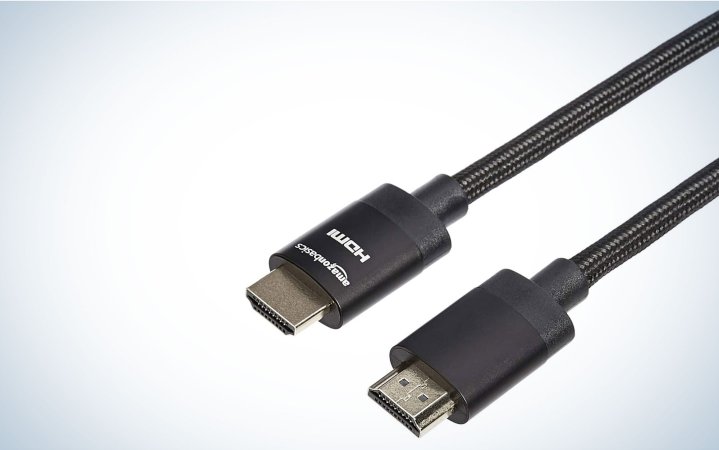We may earn revenue from the products available on this page and participate in affiliate programs. Learn more ›
HDMI (High-Definition Multimedia Interface) is one of the most common A/V connectors for TVs and monitors, and HDMI cables aren’t going away anytime soon. Whether you’re a gamer, a cinephile, or a sports fan, you want bright, clean images at high frame rates. A sub-par HDMI cable can needlessly hold your media devices back. You may have seen “HDMI 2.1” and tensed up at the prospect of yet another changing technical standard with which to keep up. Don’t worry—it’s not as complicated as it seems. We’re here to help make sure you can find the best HDMI cable to suit your particular audio-visual needs. We’ve chosen the AmazonBasics High-Speed HDMI Cable as the best all-around pick, which migh surprise you because of how cheap it is. The truth: it’s going to work just fine in a vast majority of cases.
How we chose the best HDMI cables
As you make expensive upgrades to your home entertainment system with the latest and greatest 4K television, a PlayStation 5, and an incredible surround sound system, you’ll want to make sure you’re unlocking their full potential with cables that can keep pace. The key is HDMI cables, which are straightforward and inexpensive. There’s really one stat you need to worry about: the speed. Your HDMI cable transmits data from your Blu-ray player, cable box, game console, AV receiver, or another device, and that’s it. You can only make a cable better (or worse) by improving how quickly it can send that information. Every audio- and video-related feature that might be dependent on a better cable, including HDR and that new Dolby Atmos soundbar, simply needs a pipeline with sufficient bandwidth to run properly. If they fail, there will be white static, or it won’t work at all; otherwise, they are working at full capacity without any real marginal gains and little specialization to be found.
Accordingly, the best HDMI cable is typically the cheapest certified cable that suits your needs. We combed over professional and consumer reviews and pulled from years of personal A/V experience to distill the best HDMI cables to suit various situations. All the options we’ve selected are from trusted brands and are overwhelmingly validated by users to be good for the long haul.
The best HDMI cables: Reviews & Recommendations
As stated above, HDMI cables are very straightforward, and the best one for you is probably also the cheapest, which is why Amazon Basics takes our top spot for most people. Our other top pick is the future-proofed best possible HDMI you can get for an affordable price, so it’s perfectly suited for all those 4K movies and next-gen gaming for the foreseeable future. We’ve also selected a range of specialized cables for edge cases where installation might otherwise be tricky.
Best HDMI cable all-around: AmazonBasics High-Speed HDMI Cable
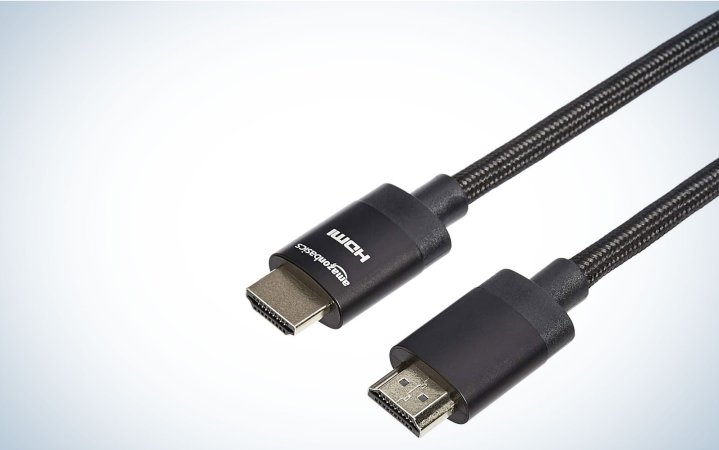
Amazon Basics is the best HDMI cable.
See It
Pros
- Inexpensive
- Durable
- Great performance
Why it made the cut: AmazonBasics keeps it simple and cheap, which makes their product the best HDMI cable overall.
Specs
- Speed: 48 GB/s
- Max Resolution: 8K/60Hz
- Length: 3/6/10 ft.
- Audio: ARC
- HDMI: 2.1
AmazonBasics products can be very hit or miss for more complex products like electronics, but HDMI cables are in their sweet spot. Any cable certified to a particular standard, if it works at all, is as good as any other outside of aesthetics or ergonomics, so there’s no need to spend more than the minimal prices offered by Amazon or Monoprice. This premium HDMI cable is a little stiff, but that also makes it more durable. According to user reviews, it’s generally considered to be better constructed than other cables at slower standards and is both our top pick and our best budget buy.
Best HDMI 2.1 cable: Zeskit Maya Ultra High Speed
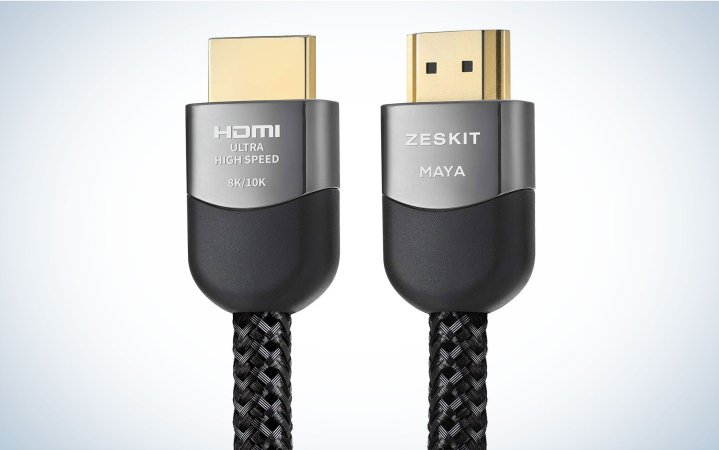
Zeskit Maya is the best HDMI cable.
See It
Pros
- Ultra High Speed performance
- Durable nylon braiding
Why it made the cut: Among certified Ultra High Speed HDMI cables, Zeskit delivers top quality at an accessible price.
Specs
- Speed: 48 GB/s
- Max Resolution: 10K/120Hz
- Length: 1.5/3/6.5/10 ft.
- Audio: eARC
- HDMI: 2.1
The best HDMI 2.1 cable offers more capacity than you will be able to use for the foreseeable future. No graphics card in existence could come anywhere close to playing a AAA game at 10K and 120 frames per second. Playing games in 4K at 120 fps is still more theory than practice for even the PlayStation 5 and Xbox Series X. Zeskit’s Ultra High Speed is certified to offer the full power of 48 GB/s, which is almost exclusively relevant to gamers for the time being. It’s durable and well-constructed. With a 5-star rating based on 17,000 Amazon reviews, players are satisfied.
Best flat HDMI cable: Ultra Clarity Flat 4K High Speed
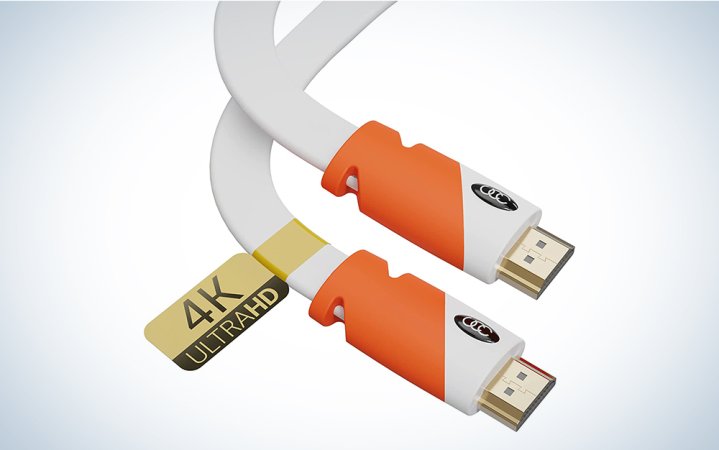
Ultra Clarity Best Flat 4K HDMI cable
See It
Pros
- Corrosion-resistant gold-plated connectors, full metal jacket, 26 AWG, triple shielding, and solid copper conductors
- Flat, CL3 for in-wall installation
- Great performance
Why it made the cut: Ultra Clarity’s sturdy, flat, and flexible cables are perfect for staying out of your way.
Specs
- Speed: 18 GB/s
- Max Resolution: 4K/60Hz
- Length: 25/30/35/40/50 ft.
- Audio: ARC
- HDMI: 2.0b
Purchasing the best flat HDMI cable can be a great resource if you have a tight space behind your television, or for when you need to run your HDMI cable under a carpet or behind some furniture, or even in your walls. Ultra Clarity offers an excellent High Speed HDMI cable with solid connectors and great performance. What sets it apart is the flat and flexible form factor, along with a PVC jacket that gives it extra durability and allows for 180-degree turns. They are a little more expensive than other cables of the same speed, but that’s the price of quality and flexibility.
Best 90-degree HDMI cable: UGREEN HDMI elbow cable
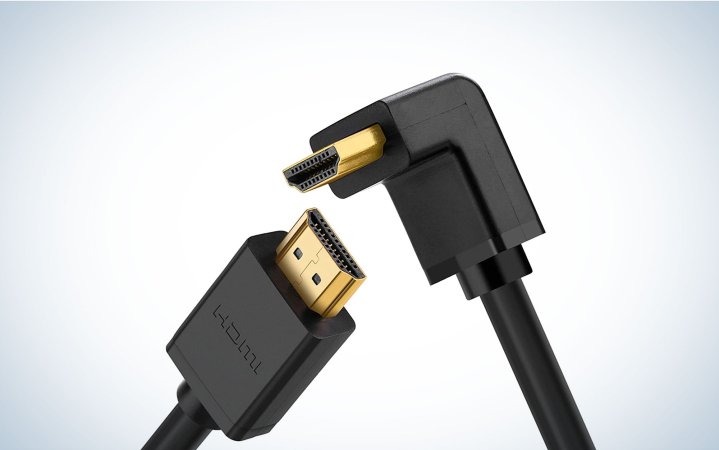
UGREEN Elbow is the best right-angle HDMI cable.
See It
Pros
- Solid 90-degree connector
- Great performance
Why it made the cut: UGREEN’s specialized right-angle HDMI is a perfect niche fix for when regular cables won’t quite fit.
Specs
- Speed: 18 Gbps
- Max Resolution: 4K/60Hz
- Length: 3/6/10/15 ft.
- Audio: ARC
- HDMI: 2.0
Shenzhen-based UGREEN is a relatively new brand that has proven reliable for high-quality electronics and accessories at reasonable prices. The company’s elbow HDMI cable has one connector with an abrupt 90-degree turn, which helps you plug into a TV or monitor mounted flush against a wall. Otherwise, this best 90-degree HDMI cable features everything you’d expect from all the cables on our list: gold-plated connectors, solid shielding, and consistent performance.
Best micro HDMI cable: BlueRigger Micro HDMI
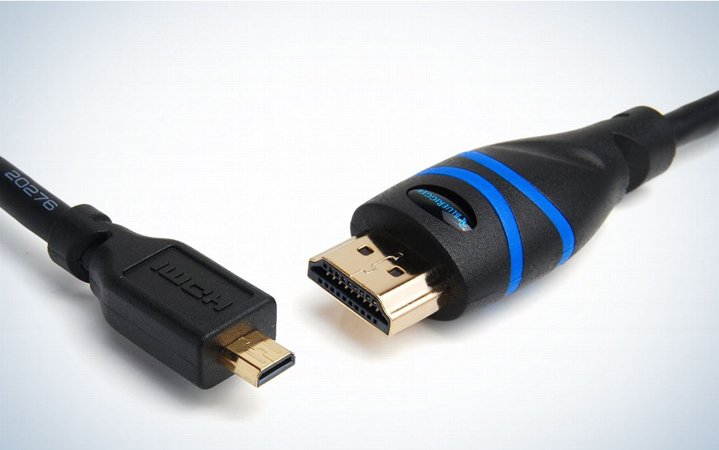
BlueRigger is the best micro HDMI cable.
See It
Pros
- Great performance
- Durable construction
- Micro USB adapter
Why it made the cut: BlueRigger’s durable micro HDMI-to-HDMI cable is a content creator’s best friend and our pick for the best micro HDMI cable.
Specs
- Speed: 18 Gbps
- Max Resolution: 4K/60Hz
- Length: 3/6/10/15 ft.
- Audio: ARC
- HDMI: 2.0
Some devices are too small for conventional HDMI jacks, which is why micro HDMI exists. This micro HDMI-to-HDMI cable lets you connect GoPros, DSLRs, camcorders, tablets, and other devices with a mini port to larger screens so that you can display your 4K/60 fps content in all its glory. It also lives up to manufacturer BlueRigger’s reputation for making durable products. And this is all the more important for an HDMI cable you’re likely to plug and unplug more frequently than a standard cable.
Best long HDMI cable: Monoprice High Speed Active
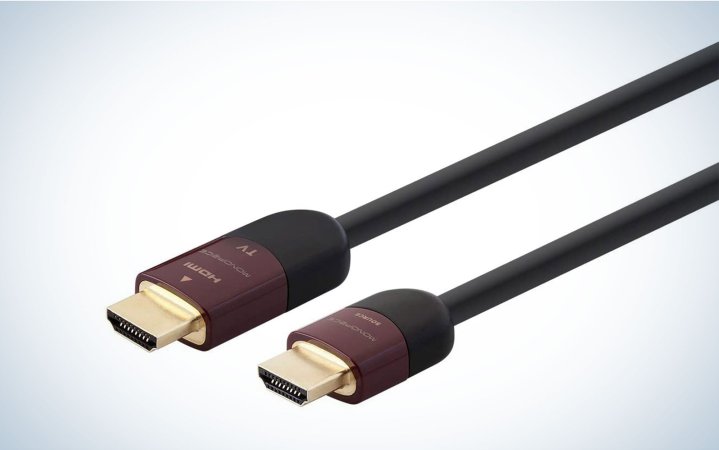
Monoprice Active is the best long HDMI cable.
See It
Pros
- Great performance
- Durable construction
- CL2-certified
- Active connection for longer distances
Why it made the cut: Monoprice’s dependable and inexpensive cables are the way to go when running HDMI over long distances.
Specs
- Speed: 18 GB/s
- Max Resolution: 4K/60Hz
- Length: 25/30/35/40/45/50/60/100 ft.
- Audio: ARC
- HDMI: 2.0
Monoprice has been widely known as one of the best brands for inexpensive certified HDMI cables for a long time. If you absolutely have to run an HDMI cable more than 25 feet—such as when you need an extension for a conference room, auditorium, or fancy home theater—then an active, directional cable is absolutely essential. It draws a bit of power from the connected hardware to boost the signal over the long distance. Monoprice’s active cable covers from 25 up to 100 feet. It’s also CL2 certified, so you can safely run it through the walls or ceiling, which is likely more appealing if you have to cover a serious distance. The cables are also backed by a lifetime return policy in case of failure, so as the best long HDMI cable, you can expect to get what you’ve paid for.
Best 8K: Monoprice 8K Certified Braided Ultra High Speed HDMI 2.1 Cable
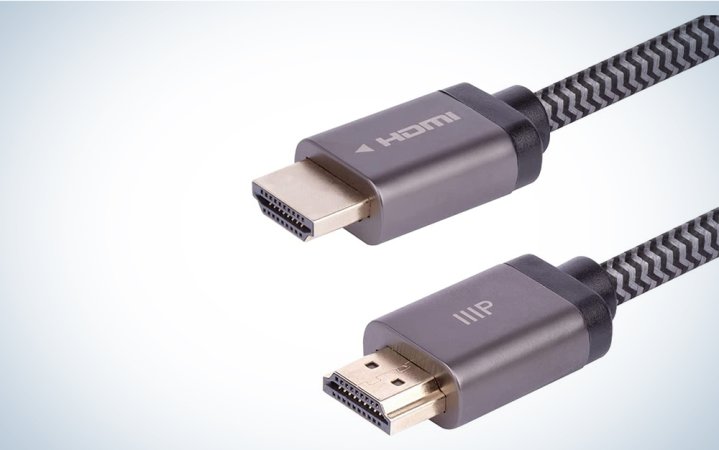
See It
Pros
- eARC
- Supports Dynamic HDR, Dolby Vision, Dolby Atmos, and DTS:X
- Compatible with Sony PlayStation 5, PlayStation S Digital Edition, Microsoft Xbox Series X, and Xbox Series S
Why it made the cut: Stream up to 10K at 120Hz refresh rate with this well-priced cable
Specs
- Speed: 48 GB/s
- Max Resolution: 8K/60Hz
- Length: 3 ft. – 15 ft.
- Audio: eARC
- HDMI: 2.1
If you’re considering investing in that amazing new Samsung 8K OLED, you should consider a high-quality cable that will do the vivid screen justice (and that might not cost as much as some 4K TVs itself). This durable braided Ethernet-enabled Monoprice cable can handle 8K/60Hz resolution and Dynamic HDR/Dolby Vision easily, and may be capable of transmitting 4K@120Hz and 10K@120Hz resolutions—meaning next-gen performance for next-gen gaming consoles. And, have no fear, object-based high-resolution audio is conveyed with equal aplomb across the Ultra High Speed Certified Cable.
Best 10K: EZQuest Ultra HD HIGH Speed HDMI 10K 60HZ Cable

The EZQuest Ultra HD HIGH Speed HDMI 10K 60HZ Cable is the best budget HDMI cable
See It
Pros
- eARC
- Supports 3D video
- Built-in strain relief
Why it made the cut: Stream up to 10K at 120Hz refresh rate with this well-priced cable.
Specs
- Speed: 48 GB/s
- Max Resolution: 10K/120Hz
- Length: 7.2 ft.
- Audio: eARC
- HDMI: 2.1
Not all 10K HDMI cables are built the same. This high-performance one from EZQuest includes features we love, like eARC and a braided nylon cable, along with a fantastic 10K max resolution at a 120Hz refresh rate. It supports 3D video and is backward compatible to support existing HDMI devices. The wires are guarded in aluminum, copper mesh, PVC, and nylon braided shielding, which prevents strain relief and helps its longevity.
Things to consider before buying an HDMI cable
HDMI cables are one of the simplest components of your home A/V system but are also very important. Depending on what you’re doing, your cable can become a crucial bottleneck to your viewing and playing, so you want to ensure you have the right technical standard. All HDMI cables are backward compatible, and the connector has remained unchanged, so you don’t need to worry about newer cables working with your old devices. Here’s a little primer on separating the good HDMI cables from the bad, no matter what you need them for.
The need for speed
Cables, HDMI or otherwise, do one thing: transmit data. HDMI data is measured in gigabytes per second (GB/s). You’ve also likely seen version numbers floating around as well (HDMI 1.4, 2.0, and, more recently, 2.1). These technically describe the communication standard being used by the hardware you’re connecting with the cables, rather than the cables themselves. All you need to know for our purposes is that you should get a Premium High Speed cable (18 GB/s) to connect HDMI 2.0 devices and an Ultra High Speed cable (48 GB/s) for HDMI 2.1 gear. If your hardware supports 2.0 or 2.1, you need the matching cable to take advantage. Older cables will still work, but the data will be throttled to whatever the cable can support, limiting framerate and resolution.
If you’re buying a new cable now, we only recommend considering the last two. Right now, Premium High Speed HDMI can handle content in 4K at 60 frames per second, which covers almost anything you can throw at your TV. Ultra High Speed may be necessary for some PS5, Xbox Series X, and high-end PC graphics cards to output at their absolute best in some cases, but right now it is fairly rare. Meanwhile, 8K video only exists for research and tech demos. In other words, Ultra High exists mostly in anticipation of future hardware and content. There’s nothing wrong with future-proofing, but know that Ultra High Speed is overkill for most people.
ARC and eARC
Established in 2009 as part of HDMI 1.4, ARC (Audio Return Channel) is a feature that allows the HDMI cable to run audio data back and forth between your TV and a separate audio receiver or soundbar. This can simplify your set-up by reducing the need for a discrete audio cable and allowing for simplified control of your systems with the TV’s remote. It’s been part of the HDMI standard long enough that most cables support it, and certainly any new ones. A drawback is that it does not support HD audio standards like Dolby Atmos or 5.1 surround sound.
Meanwhile, eARC (the “e” standing for “enhanced”) is a more recent upgrade to ARC along with the HDMI 2.1 standards. Taking advantage of the torrential 48 Gbps that Ultra High Speed cables support, it can fully support uncompressed audio. Since eARC is baked into HDMI 2.1, you will need an Ultra High Speed HDMI cable to get the full effect.
Length and wall installation
As with pretty much any type of cable, shorter is better. With a longer HDMI cable, you’re more likely to experience some level of signal degradation. If you run an HDMI cable over 25 feet or more, you may notice issues like visual artifacts, dimming, and input lag.
If you absolutely can’t bring your source and monitor closer together, you should consider using an “active” HDMI cable, which draws a little bit of power from the connected device to boost its signal and send it substantially further while maintaining quality. Active cables are a little more complicated to set up because they only draw power from one side. You’ll need to ensure it’s plugged in the right way before committing to a setup. They are also more expensive than other cables, given their length and the additional tech involved.
If you plan to run your cable through a wall or ceiling as part of that long run, then you need to make sure your cable is certified as “CL2” or “CL3” (class 2 or 3), meaning it’s rated for wall installation. Standard cables pose greater fire risks when running through walls and potentially contacting with screws, nails, and other metal hardware. CL2 cables (including HDMI, among other types such as speaker wires) are rated for home use, up to 150 volts, while CL3 goes up to 300 volts for commercial installation. Both are made safer with special coating that reduces their risk of catching fire and gives off less toxic gas if they do.
FAQs
Depending on the length and included features, the best HDMI cables run from $8-$20. Prices increase with length.
Nope! HDMI cables are a simple piece of hardware that does one thing, and aside from the very specialized examples we gave above, there aren’t any special features for which you can pay extra. Just get the least expensive cable from a reliable brand that meets your needs.
For the vast majority of people, not at all. HDMI 2.0 can already support 4K 60 Hz, which can handle any video content and all but the most powerful gaming hardware. HDMI 2.1 is only worth considering if you have one of the few sources that can use it, such as a PlayStation 5, Xbox Series X, or a very new and powerful PC graphics card.
That depends on your hardware and the Dolby audio codec it supports. For “Dolby Digital Plus” devices, any Premium High Speed (HDMI 2.0) cable or later should support Atmos over ARC (including all the cables on this list). However, if it’s the lossless “Dolby TrueHD” format, you may need the additional bandwidth of an HDMI 2.1 cable.
No, not all HDMI cables have the bandwidth for 4K 120Hz signals. “Standard” and “High Speed” HDMI are still widely circulated and can support 4.95 and 10.2 GB/s, respectively. High Speed HDMI can support up to 4K resolution at 30 Hz, which is good enough for most film and television, though not all the most advanced, dynamic forms of HDR. “Premium High Speed” is the next step up, jumping to 18 GB/s, or enough to handle 4K HDR content at 60 Hz, which can support almost any contemporary application. The fastest level, “Ultra High Speed,” can transmit a whopping 48 GB/s, opening the door for 10K resolution at 120 Hz.
Final thoughts on the best HDMI cables
Hopefully, this clears up any confusion about what you need to consider when buying the best HDMI cable to complete your home theater. HDMI 2.1 is tempting and probably worthwhile if you’ve got (or plan to get) cutting-edge gaming hardware. Most importantly, keep it simple with known brands and low prices. There aren’t any additional features that make more expensive cables worth buying, so don’t let a salesman convince you otherwise.

